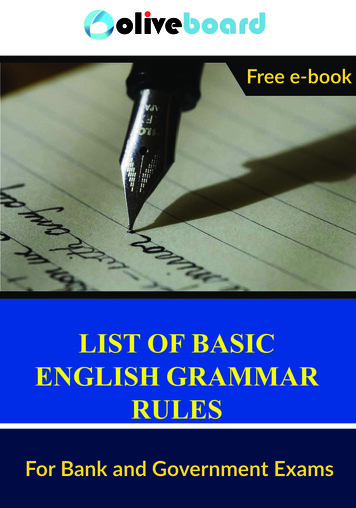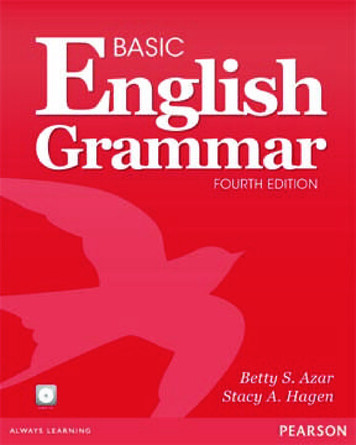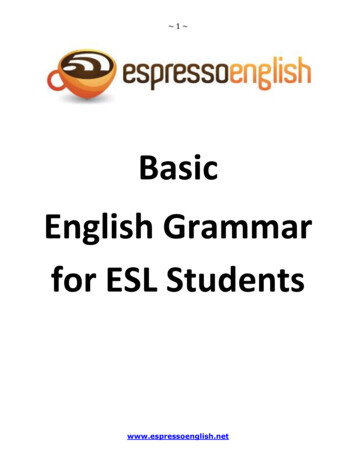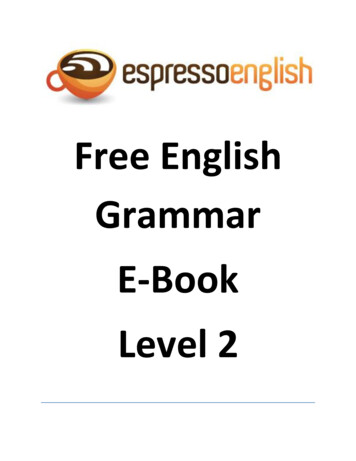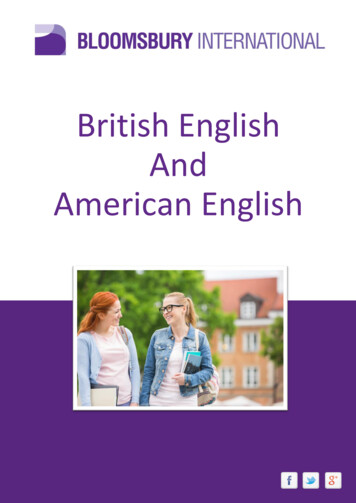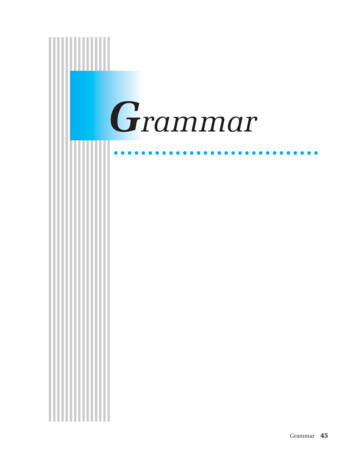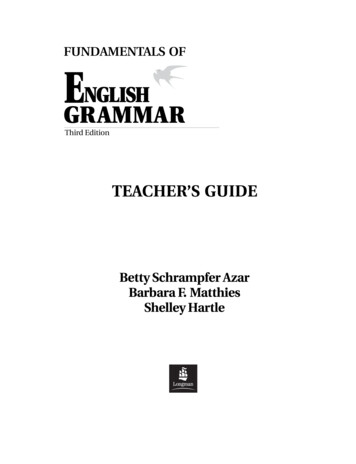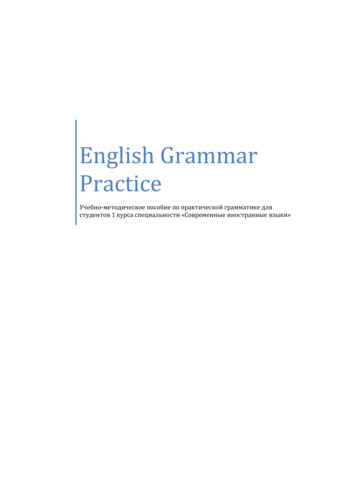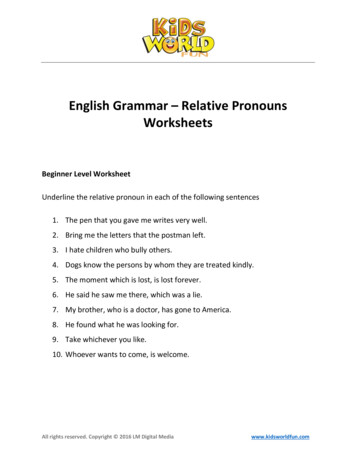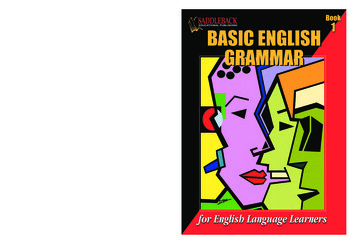
Transcription
BookBASIC ENGLISHGRAMMAR1Younger students at beginning to intermediate levels willgreatly benefit from this step-by-step approach to Englishgrammar basics. This is the ideal supplement to yourlanguage arts program whether your students are nativeEnglish speakers or beginning English language learners.Skill-specific lessons make it easy to locate and prescribeinstant reinforcement or intervention. Illustrated lessons are tightly focused on core conceptsof grammar Nearly 70 practice exercises are includedfor ready reinforcement A wealth of examples are provided on every topic Concise explanations are bolstered by extra grammartips and useful language notesBASIC ENGLISH GRAMMAR Book 1BookBASIC ENGLISHGRAMMAR1
Book1Anne Seaton Y. H. Mew
Three WatsonIrvine, CA 92618-2767Web site: www.sdlback.comFirst published in the United States by Saddleback Educational Publishing, 3 Watson, Irvine,CA 92618 by arrangement with Learners Publishing Pte Ltd, SingaporeCopyright 2007 by Saddleback Educational Publishing. All rights reserved. No part of this bookmay be reproduced in any form or by any means, electronic or mechanical, including photocopying,recording, or by any information storage and retrieval system, without the written permission of thepublisher.ISBN 1-59905-201-6Printed in the United States of America13 12 11 10 09 08 07 9 8 7 6 5 4 3 2 1
IntroductionGrammar is a very old field of study. Did you know that thesentence was first divided into subject and verb by Plato,the famed philosopher from ancient Greece? That wasabout 2,400 years ago! Ever since then, students all overthe world have found it worthwhile to study the structureof words and sentences. Why? Because skill in speakingand writing is the hallmark of all educated people.Lesson by lesson, this book provides basic instructionin the eight parts of speech—nouns, pronouns, verbs,adjectives, adverbs, prepositions, conjunctions, andinterjections—as well as the standard patterns of Englishsentences.All students of English, be they native speakers or thosewho are studying English as a second language, willprofit from the fundamental introduction and review ofgrammar provided by SADDLEBACK’S BASIC ENGLISHGRAMMAR 1 and 2. Helpful marginal notes throughoutthe books have been provided to reinforce existing skillsand call attention to common problem areas.We wish you every success in your pursuit of Englishproficiency.
1 What is Grammar?52 The Capital Letter63 Nouns 8Common NounsProper NounsSingular NounsPlural NounsCollective NounsMasculine and Feminine Nouns4 PronounsPersonal PronounsReflexive PronounsInterrogative PronounsDemonstrative Pronouns5 AdjectivesAdjective EndingsKinds of AdjectivesComparison of Adjectives681321233437444748495254586571The ArticlesDemonstrative DeterminersInterrogative DeterminersPossessive Determiners71737475The Simple Present TenseAm, Is and AreThe Present Progressive TenseHave and HasThe Present Perfect Tense98991041061081121131151208 Subject-Verb Agreement1239 Adverbs12744Determiners7 Verbs and TensesThe Simple Past TenseRegular and Irregular VerbsWas and WereThe Past Progressive TenseThe Future TenseCan and CouldMay and MightDo, Does and DidWould and Should79808389939610 Prepositions13211 Conjunctions13512 Interjections13813 Sentences139What is a Sentence?139Kinds of Sentences140The Imperative141The Subject and the Object143Direct and Indirect Objects144Positive and Negative Sentences 146Questions14714 PunctuationPeriodCommaExclamation PointQuestion MarkApostrophe150150151152152153
1What is Grammar?Here’s an old children’s rhyme about the eight parts ofspeech of English grammar. It gives you an idea of whatgrammar is about. Read and remember it.Every name is called a noun,NounAs field and fountain, street and town.PronounIn place of noun the pronoun stands,As he and she can clap their hands.The adjective describes a thing,As magic wand or bridal ring.AdjectiveMost verbs mean action, something done,VerbTo read and write, to jump and run.How things are done the adverbs tell,itionPreposAs quickly, slowly, badly, well.AdverbThe preposition shows relation,As in the street or at the station.Conjunctions join, in many ways,Sentences, words, or phrase and phrase.The interjection cries out, “Heed!ConjunctionAn exclamation point mustfollow me!” Interjection
2The Capital LetterThe capital letter is also called a big letter or upper-case letter, or sometimes just a capital.ABCDEFGHIJKLMN OPQRSTUVWXYZWhen do you use a capital letter?4 Use a capital letter for the first letter in asentence:The dog is barking.Come here!4 Always use a capital letter for the word I :I am eight years old.Tom and I are good friends.4 Use a capital letter for the names of people:Alice, Tom, James, Kim, Snow White4 Use a capital letter for the names of places:National Museum, Bronx Zoo, London, Sacramento4 Use a capital letter for festivals, holidays,days of the week, months of the year:New Year’s Day, Christmas, Labor Day, Mother’s Day,Sunday, Monday, Friday, January, May, July, October
Exercise 1Circle the letters that should be CAPITALS. Then writethe correct letter in the space above them.12peter and i are good friends.we are going to chicago during our summervacation.3there is an interesting football game on sunday.4jason lives on thomson avenue.5 january is the first month of the year.Exercise 2Look at the signs on the left. Can you find themistakes? Write the names correctly.hopkins hotellincoln schoolorchard streetnewton roadbotanic gardensnational libraryshea stadium
3NounsCommon NounsNouns are divided into common nouns and proper nouns.Common nouns are words for people, animals, places,or things.These are words for people. They are common nouns.artistWord FileHere are more words for people:actorauntbabybakercookdentistdoctorgiantyou knowDidlawyerjudgemannursepolice nother word for astronaut isspaceman or spacewoman.
These are words for animals. They are common nouns.eaglezebradeercrocodilebirdbearWord FileHere are more words for animals:catcowdogdolphinduckfishgoat goosehenhorsemouseparrotsharkwhale
These are words for places. They are common nouns.beachparkWord FileHere are more words for places:libraryshopEverfresh ashorestadiumsupermarkettemplezoo
These are words for things. They are common nouns.basketbeddrumcakeblanketWord FileHere are more words for window
Exercise 1Underline the common nouns in these sentences.1 There’s a little bird in the garden.2 Who is your teacher?3 Don’t eat that rotten apple.4 Kate has a lovely doll.5 I like reading stories.6 My father is a doctor.7 Every child has a dictionary.8 Rudy hates bananas.9 The phone is ringing.10 Here’s a book for you.Exercise 2Here’s a mixed bag of words. Put each word under itscorrect gfoxtaxifire parrotcamelThings
Proper NounsProper nouns are names for particular people, places orthings. They always begin with a capital letter.OmarBeethovenSanta ClausWord FileHere are some more namesof people:Ali BabaFlorence NightingaleDerek JeterPaulineJohnny DeppPatrickHarry PotterPinocchioRobin Hoodyou knowDidLisa?Your own name and the namesof your friends are propernouns too.13Kim Lee
The names of countries and their people are alsoproper ansItaliansthe MalaysiansPakistanisthe FrenchThais14
The names of towns, cities, buildings and landmarksare proper nouns.EgyptHong Kongthe Great Wall of Chinathe Statue of LibertyTokyoBangkokLondonNew YorkParisBeijingSydneyNew DelhiDenverthe Grand CanyonCentral Parkthe Leaning Tower of Pisathe Eiffel TowerBrooklyn BridgeBig BenPike’s Peak15
The days of the week and months of the year are rOctoberNovemberDecemberowDSundayMarchMarch5Mayyou knMarch1JanuaryidMarch?January is the first month of the year.Sunday is the first day of the week.A table that shows the months, weeks anddays16
The names of mountains, seas, rivers and lakes areproper nouns.Mount Everestthe ThamesLake Michiganthe Alpsthe Dead SeaMount FujiNiagara Fallsyou knowDidthe Himalayasthe Pacific Oceanthe Yellow River?You often use the before names of oceans,rivers, seas and ranges of mountains.Mount means mountain.It is often used in the names of mountains.For example: Mount EverestMount St. HelensThe written short form for Mount is Mt.For example: Mt. Everest, Mt. Fuji17
The names of festivals, some special events and holidaysare proper nouns, too.Valentine’s DayFather’s DayHalloweenWord FileHere are more names of festivals and holidays:ChristmasMemorial DayLabor DayIndependence DayMother’s DayApril Fool’s DayThanksgiving DaySt. Patrick’s Day18New Year’s Day
Exercise 1Underline the proper nouns in the followingsentences.1 July is often the hottest month in summer.2 One day Ali Baba saw the forty thieves hiding in acave.3 Shawn and Ashley are going to the beach for a swim.4 Mr. Lee is reading a book.5 “I am your fairy godmother,” said the old woman toCinderella.6 Uncle Mike is a lawyer.7 Next Tuesday is a public holiday.8 Many children enjoyed the movie Lion King.Exercise 2Look at the words in the box. Which ones are commonnouns and which ones are proper nouns? Put each wordunder its correct heading.LisaJanuarydoctorbankbeachmonthPresident HotelWhite Sand BeachDr. WangCommon NounsUnited BankhotelgirlProper Nouns19
Exercise 3Write C for common or P for proper on the blankbefore each noun.1 the White House2 the green dress3 the tall building4 the Empire State Building5 the Yellow River6 the muddy river7 the governor8 Governor Parker9 the Oregon Trail10 the winding trailExercise 4Underline the nouns that should be capitalized. Circle thenouns that should not be capitalized.1 Robert louis Stevenson wrote treasure island.2 The Capital of illinois is Springfield.3 My Friends and I prefer Glittergums toothpaste.4 Their Family visited Yellowstone national Park.5 Juan and maria attend kennedy Middle school.6 We had a Surprise Party for aunt Helen.7 Spring and Fall are my favorite Seasons.8 The Manager scolded his lazy Employees.20
Singular NounsNouns can be singular or plural. When you are talkingabout one person, animal, place, or thing, use a singularnoun.an owla shipa traina womanWord FileThese are also singular nouns:an airplanea bicyclea boya busa comba girla keya flower21a lettera mapa photographa refrigeratora slidea swinga van
Grm ar Helpam4 Use a or an before singular nouns.Use an before words beginning with vowels(a, e, i, o, u). For example, say:an axean eggan envelopean ice creaman iglooan orangean umbrellaan uncle4 But some words don’t follow this rule. For example,use a (not an) before these words that begin with u:a uniforma university4 Use a before words beginning with the otherletters of the alphabet, called consonants.For example, say:a basketa bowla cara hilla housea rainbowa monstera pillowa watcha zoo4 But some words don’t follow this rule. For example,use an (not a) before these words that begin with h:an heiran honoran hour22
Plural NounsWhen you are talking about two or more people,animals, places, or things, use plural nouns.Most nouns are made plural by adding -s at the end.starbatsbatstarsmugWord sshirtsspoonsfanmugscapfanscaps23
Some plural nouns end in -es.glassbrushbusglassesbrushesbusesWord Filewatchwatchesfoxesamm ar hesdishesdressessandwicheswitcheschWhen the last letters of singularnouns are ch, sh, s, ss or x,you usually add -es to formthe plural.24shsssx es
Some plural nouns end in -ies.butterfliescanariescanarybutterflyWord errieslilieslilycandiescandym ar flyladylibrarypuppystorystrawberry iNouns like these are madeplural by changing y to i, andadding -es.25yes
What if there is a vowel before the y?In that case, add -s to form the plural.sykeyturkeykeysturkeystrayWord donkeysjerseyskidneysmonkeystoystrolleysvalleys
If a noun ends in -f, you often change f to v, and add sthieveswolvesvesfOften nouns that end in -f, justneed -s to form the plural.fPluralcalveselveshalvesleavesm ar arPluralchefchefshandkerchief fsheriffsFor some words that end in -f, the plural can be spelledin two different ways.SingularPluraldwarf dwarfs or dwarveshoofhoofs or hoovesscarfscarfs or scarvessfvesWith some words that end in -fe, you change f to v, and add -s.you fv e?But you only add -s to giraffe to form theplural.27s
If a noun ends in -o, you just add -s to form the plural.a rhinorhinosWord Filea kangarookangaroosSingulara hippoa videoa zooPluralhipposvideoszoosBut with some nouns that end in -o, you add -es to formthe plural.Word Filem ar HmaelpGra flamingoflamingoesSingulara tomatoa potatoa heroPluraltomatoespotatoesheroesWith some nouns that end in -o, you can addeither -s or -es to form the plural.Singulara mangoa mosquitoa zeroa ralmangosmosquitoszerosbuffalos
Some plural nouns don’t follow the -s rule. They don’t end in-s, -es, -ies or -ves. Instead, the word changes form.mousemicegoosegeeseWord FileSingularchildmanoxtoothwomanyou knowDidPluralchildrenmenoxenteethwomenfoot?The plural of the mouse that youuse with your computer is eithermice or mouses.29feet
Some plural nouns are the same as the singular noun.sheepsheepreindeerreindeerfishWord FileSingularbisondeerfishyou knowDid?You can use fishes as the plural offish when you are talking aboutdifferent kinds of fish: all the fishesof the Pacific Ocean.30Pluralbisondeer
Some nouns are always plural.binocularsgogglesWord u knowDidscissorssneakersslippersstockings?Another word for spectaclesis glasses.amm ar HelpGrspectaclesYou can make these plural nouns singular byusing a pair of:a pair of binocularsa pair of spectaclesa pair of gogglesa pair of jeansa pair of shortsa pair of pliersa pair of shoes31
Exercise 1Look at the words below. Do you know which onesare singular and which are plural ? Put a checkmark( ) in the correct box.Singular bfoxesExercise 2Do you add -s or -es to these singular nouns to makethem plural? Write your answers on the lines.SingularPluralSingularPlural1 desk6 basket2 class7 peach3 comb8 belt4 mug9 taxi10 box5 bus32
Exercise 3Do you change -y to -ies, or just add -s to makethese singular nouns plural? Write your anwers.SingularPluralSingular1 key6 toy2 city7 baby3 butterfly8 party4 monkey9 chimney5 flyPlural10 ladyExercise 4All these singular nouns end with -o. Add either -s or -esas you write the plurals on the line.SingularPlural Singular1 video6 radio2 piano7 hippo3 mango8 zoo4 kangaroo9 zero5 rhino10 photo33Plural
Collective NounsCollective nouns are words for groups of people,animals or things.These are nouns for groups of people.a familya crewan orchestraWord FileHere are some more groupsof people:ama ganga groupa teamm ar HelpGran audiencea banda choira classMany collective nouns can be used with asingular or plural verb.For example:My family was happy to see me.orMy family were happy to see me.But the following collective nouns always take a plural verb:cattlepeoplethe police34
Here are more collective nouns that are used for groupsof people, animals or things.a brood of chickensa band of musiciansa school of fishWord FileHere are some morecollective nouns:a bunch of keysa class of pupilsa collection of booksa deck of cardsa fleet of shipsa flock of sheepa gaggle of geesea gang of robbersa herd of cattlea litter of cubsa pod of whalesa pack of wolvesa pride of lionsa set of stampsa swarm of beesa troupe of actorsa team of playersa flight of steps35
ExerciseFarmer John had several different kinds of animalson his farm. Write the correct collective noun foreach group of his animals.Farmer John had:aof geeseaof sheepaof cattleaof horsesOne day aof coyotes tried to attack his animals.Farmer John yelled and waved a pitchfork to frighten themaway.36
Masculine and Feminine NounsMasculine nouns are words for men and boys, andmale animals.Feminine nouns are words for women and girls, andfemale animals.roosterbridegroombridehenlionlionessWord emininegirlwomanprincessstewardesswaitress
Here are some more masculine and feminine nouns forpeople.you asculine nouns belong to themasculine gender.Feminine nouns belong to thefeminine gender.38
Here are some masculine and feminine nouns for maleand female osemarelionessewetigressyou knowDidAnimal?Nouns that end in -ess and -ress often belongto the feminine gender. For example:actress stewardesslioness tigressprincess waitress39
Many nouns are used for both males and females.dancersdoctorsscientistsWord FileNouns like these are used forboth males and samm ar hersWe call these nouns common-gender nouns.40
Words for things that are neither male nor female arecalled neuter nouns.leavesbenchfiremirrorwaterfallWord FileHere are some neuter stgymnasiumplaygroundrockskysockswind
Exercise 1Fill in the blanks with the correct masculine orfeminine nouns.1MasculineFemininemaster2 uncle3niece4lioness5 tiger6empress7 husband8 son9mother10madamExercise 2Fill in each blank with a suitable masculine or femininenoun.1 The host and the welcomed their guests.2 The steward and the look after thepassengers on the plane.3 My uncle and lived in Nebraska.4 The king and the had two children, a boyand a . The prince was eight and thewas five.5 Ladies and , welcome to our party thisevening.42
Exercise 3Look at the words in the box. Write each word underits correct ggirlteacherwizardfishCommon Gender43Neuter
4PronounsA pronoun is a word that takes the place of a commonnoun or a proper noun. There are different kinds of pronouns.Personal PronounsThe words I, you, he, she, it, we and they are calledpersonal pronouns. They take the place of nouns andare used as the subject of the verb in a sentence.My name is David. I am the youngest in the family.This is my father. He is a teacher.This is my mother. She is a lawyer.I have a brother and two sisters.They are Peter, Sharon and Jenny.I have a dog. It is called Lucky.Lucky, you are a good dog.Good morning, children! You may sit down now.amm ar HelpGrMy family and I live in a big city. We have an apartment.The subject of a sentence is the person, animal,place or thing that does the action shown by theverb.44
The words me, you, him, her, it, us and them are alsopersonal pronouns. They also take the place of nouns.These pronouns are used as the object of the verb in asentence.I am standing on my head. Look at me.My mother is kind. Everybody likes her.Lisa, I told you to tidy your bed!Sharon and Jenny! Dad is waiting for you!Lucky and I are playing in the park. Dad is watching us.You must not play with the knife. Give it to me.Pick up your toys and put them away.amTom likes riding my bicycle.I sometimes lend it to him.m ar HelpGrBaby birds cannot fly.Mother bird has to feed them.The object of a sentence is the person, animal,place or thing that receives the action shown bythe verb.45
Grm ar HelpamThere are three groups of pronouns: first person,second person and third person.The person speaking is called the first person.The first-person pronouns are I or me (in the singular) andwe or us (in the plural).The person spoken to is called the second person. Thesecond-person pronoun is you (in both singular and plural).The person (or animal, or thing) spoken about is called thethird person. The third-person pronouns are he or him, she orher, and it (in the singular), and they or them (in the plural).The word I is always spelled with a capital letter.The pronoun he is used for men and boys, she forwomen and girls, and it for things and animals.Here is a table to help you.SubjectObjectFirst person singularSecond person singularThird person singularIyouhesheitmeyouhimheritFirst person pluralSecond person pluralThird person pluralweyoutheyusyouthem46
Reflexive PronounsThe words myself, yourself, himself, herself, itself,ourselves, yourselves and themselves are calledreflexive pronouns.They refer to the person or animal that is the subject ofthe verb.I made this cake myself.Be careful with the knife. You’ll cut yourself.Michael is looking at himself in the mirror.Susan has hurt herself.Our cat washes itself after each meal.We organized the party all by ourselves.Come in, children, and find yourselves a seat.amm ar HelpGrBaby birds are too young to look after themselves.Here is a table to remind you about reflexivepronouns.First personSecond personThird personSingularPlural(I,me) myself(you) yourself(he, him) himself(she, her) herself(it) itself(we,us) ourselves(you) yourselves(they, them) themselves(they, them) themselves(they, them) themselves47
Interrogative PronounsThe words who, whom, whose, what and which arecalled interrogative pronouns.These pronouns are used to ask questions.WhomWhoWho is he talking to?Who are those people?Whom are you playing with?Whom is he talking to?WhichWhoseWhich of these bags is yours?Which do you prefer?Whose is this umbrella?Whose are these gloves?Whatamm ar HelpGrWhat is your dog’s name?What are you talking about?What is the time?Who can be used as the object of a verb as wellas the subject.Whom is used only as the object. For example,you can say:Who are you playing with?orWhom are you playing with?48
Demonstrative PronounsThe words this, these, that and those are calleddemonstrative pronouns. They are showing words.Those are goats.That is John’s house.That is a mountain.Those are horses.What are those?We can do betterthan that.No, that’s not mine.You mean you won?That’s amazing!Hello, who is thatspeaking, please?Hello, is that you,George?These are sheep.m ar HmaelpGrThis is my house.This is a hill.These are donkeys.What is this?Did you drop this?Hi, Jane! This is Michael!You use this and these when you point to thingsnear you.You use that and those when you point to thingsfarther away.Demonstrative pronouns can be singular or plural:Singularthisthat49Pluralthesethose
Exercise 1Draw a line to join each of the subject pronounsto the object pronoun that matches.Iheitshetheyyou weusheryouthemmehim itExercise 2Fill in the blanks with the correct pronouns.1Peter and I are brothers. share a bedroomtogether.2 Sue isn’t well. Dad is taking to see a doctor.3 My brother is a teacher. teaches English.4 All his students like very much.5 Children, are making too much noise!6 Who are those people? Where are from?7 Mom is a doctor. works in a hospital.8 The sky is getting dark. is going to rain.9 John, we are all waiting for . Are you comingwith ?10 May borrow your pen?11Yes, of course. When can you return to?12 What are reading, Jenny?50
Exercise 3Fill in the blanks with the correct reflexive pronounsfrom the elfourselvesmyselfherselfNo one can help us. We have to help .Jane always makes the bed by .They painted the wall all by .I hurt in the playground yesterday.John, you must behave before your friends.Children, you must do the homework .Tom defended against the bullies.The dog is scratching .Exercise 4Write the correct interrogative pronouns in the blanks tocomplete the sentences:1 is the matter with you?2 invented the computer?3 of the twins is older?4 do you wish to speak to?5 is this car in front of our house?6 knows the answer?7 came first, the chicken or the egg?8 would you like to drink?9 of them do you think will win the race?10 is the word for a stamp collector?51
5AdjectivesAn adjective is a describing word. It tells you more abouta noun. An adjective usually appears before the nounit describes. Sometimes, though, the adjective appearsafter the noun, later in the sentence.a smart dogan old buildinga busy streeta dark cornera deep seaa large bedIt is windy.John’s handwriting is very neat.The sea is rough.All the players are very tall.The baby’s hands are very small.Sue’s drawing is beautiful.That problem is too difficult.Peter is very quiet today.52a tall basketball playera low fence
Exercise 1Underline the adjectives in the following sentences.1There is an empty room upstairs.2 It’s a hot summer.3 You are so kind.4 Don’t be crazy.5 This park is clean and green.6 Many people exercise to keep healthy.7 I think these eggs are rotten.8 We are all bored. There isn’t anything to do.9 The pupils don’t find the joke amusing.10 James was absent because he was ill.Exercise 2Fill in the blanks with suitable adjectives from the box.hothighlargesweetshort freepoor playful1The ice cream is very .2It’s very in summer.3The company is giving away gifts to itscustomers.4They live in a house.5Jean is wearing a skirt.6The climbers are climbing up a mountain.7These puppies are very .8Many people have no home.53
Adjective EndingsAdjectives have different endings.Some adjectives end in -ful or -less.playful puppiesm ar HmaelpGrhomeless peoplea beautiful dressa careless drivera faithful doga harmless insecta useful toolcarefulcolorfulAn adjective that ends in -less is the opposite ofthe same adjective that ends in -ful.For example:– careless– colorlessuseful –harmful –uselessharmlessThe -ful ending means having a lot of something.For example:painfulhopeful having a lot of painhaving a lot of hopeThe -less ending means without.For example:leafless sleeveless without leaveswithout sleeves54
Some adjectives end in -y.a dirty streeta noisy rooman oily pota sleepy passengera sunny daya stormy seaa muddy pathSome adjectives end in -ive.an expensive necklacean active childan attractive hata creative toytalkative pupilsSome adjectives end in -ing.a caring nursean interesting bookloving parentsmatching clothesa smiling facea cunning foxdazzling sunshine55
Some adjectives end in -ly.ama daily newspapera friendly police officerm ar HelpGra costly diamond ringan elderly womanlively kittensa lonely boya lovely girla weekly magazineMany adverbs also end in -ly.Here are some adjectives with the endings -able, -al,-en, -ible, -ish and -ous.a broken chaira famous pop singerchildish behaviora comfortable chaira dangerous placea foolish acta horrible smella loveable koalaa national costumea musical instrumenta terrible messa woolen sweatera wooden table56a poisonous snake
Exercise 1Add the correct endings to turn these wordsinto adjectives.-y1-fulpeace-less-al6 dirt2 storm7 music3 mud8 nation4 forget9 dust5 spot10 playExercise 2Add the correct endings to turn these wordsinto adjectives.-en-ish1wind-y-ous-ing-ly6 fool2 gold7 charm3 friend8 child4 rot9 love5 danger10 interest57
Kinds of AdjectivesThere are different kinds of adjectives.Some adjectives describe the qualities of nouns.a cold drinka hot bunan ugly monstera fierce doga loud crash58a beautiful rainbowa clever monkeya difficult questionhappy childrena kind ladya new caran old housea pretty girla rich familya sad storya strong mana wicked queen
Some adjectives tell you which place or country a personor thing comes from, or belongs to. They are calledadjectives of origin.Chinese kungfuan Indian templea Mexican hatDutch clogsAustralian applesa Balinese dancerthe English languagethe French flagan Italian cara Japanese gardena Scottish kiltThai boxingA Filipino shirt59
Some adjectives tell you the color of things.Please get me some white paint.The sky is gray.The sea
Lesson by lesson, this book provides basic instruction in the eight parts of speech—nouns, pronouns, verbs, adjectives, adverbs, prepositions, conjunctions, and interjections—as well as the standard patterns of English sentences. All students of English, be they native speakers or those who are stu
